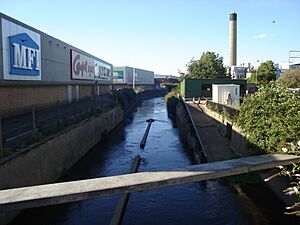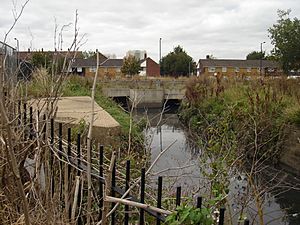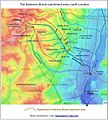Salmons Brook facts for kids
Salmons Brook is a small river in the London Borough of Enfield. It flows into the River Lea. Think of it as a smaller stream that joins a bigger river.

Contents
Where Did the Name Come From?
Salmons Brook got its name a long time ago. It was shown on a map made by John Rocque in 1754. The name probably came from a family called Salemon. A person named John Salemon lived in Edmonton in 1274.
Where Does Salmons Brook Flow?
Starting Point
The brook starts in an area called Enfield Chase. This is near the old Enfield Old Park.
Journey Through North London
It then flows east, passing close to Trent Park. It also goes near Bush Hill Park. Here, it flows under the New River. This part of its journey takes it into Edmonton.
Hidden Sections
In Edmonton, the brook goes underground. This is called being "culverted." It flows beneath the Edmonton Green shopping area. It comes out again at Plevna Road. Here, it runs next to the Pymmes Brook Trail.
Joining Other Streams
Salmons Brook then passes by the Edmonton Federation Jewish Cemetery. It also goes by the Tottenham Park Cemetery. It flows under Montagu Road. Here, another stream called Saddlers Mill Stream joins it. This area can sometimes have serious floods.
Final Stretch
The brook continues west through open land. It goes under the Lea Valley Lines railway tracks. Soon after, water from the Deephams Sewage Treatment Works joins it. It then flows through the Eley Industrial Estate. It also passes close to the Edmonton Incinerator. You can see the brook as it goes under the North Circular Road. This is near Angel Road. Finally, Salmons Brook joins up with Pymmes Brook.
Flooding History
Salmons Brook has flooded several times in the past. The last big flood happened in October 2000. This affected the Montagu Road area of Edmonton.
Images for kids
-
Clarendon Arch is a tunnel that carries Salmons Brook under the New River at Bush Hill. It was first built as a bridge between 1608 and 1613. In 1682, a new arch replaced the bridge. This arch was named after the Earl of Clarendon. He was the head of the New River Company at that time. The arch was rebuilt again in 1725. Today, it is a protected building because of its history.
 | Delilah Pierce |
 | Gordon Parks |
 | Augusta Savage |
 | Charles Ethan Porter |




